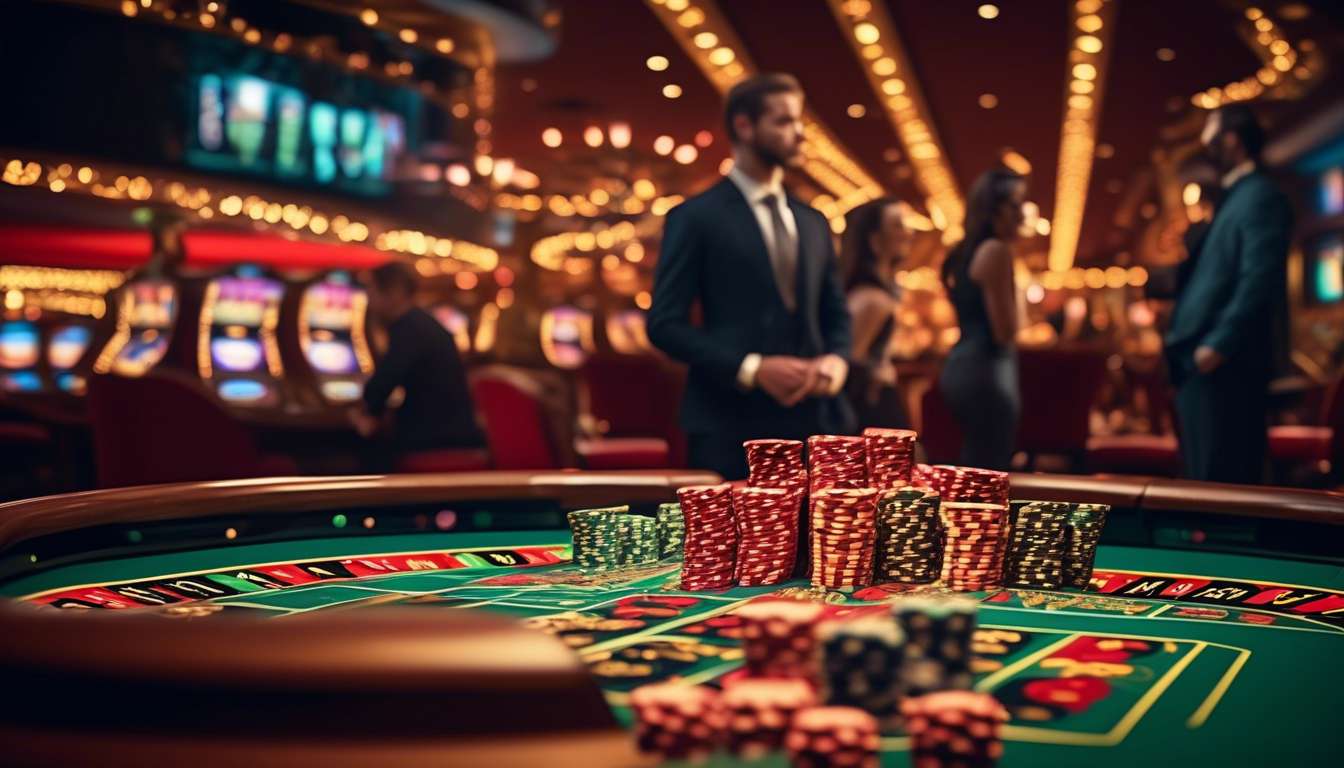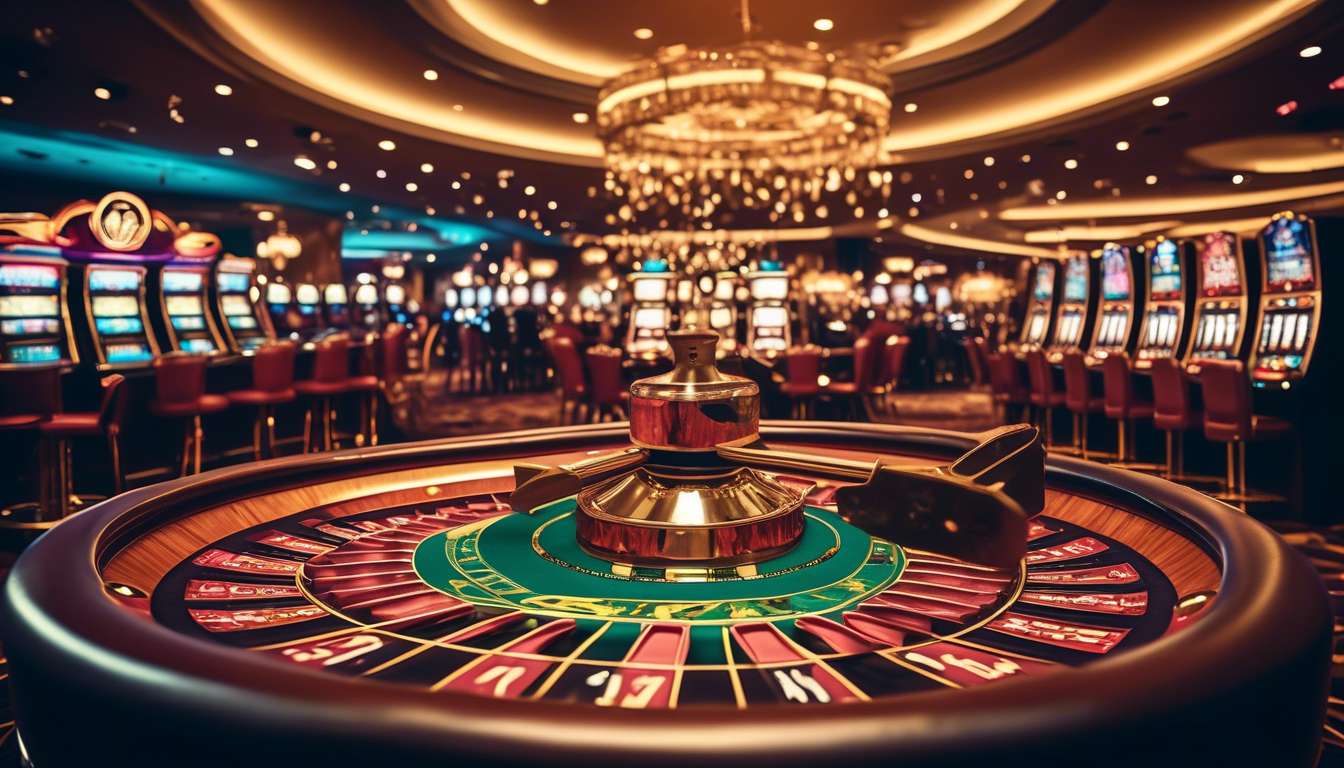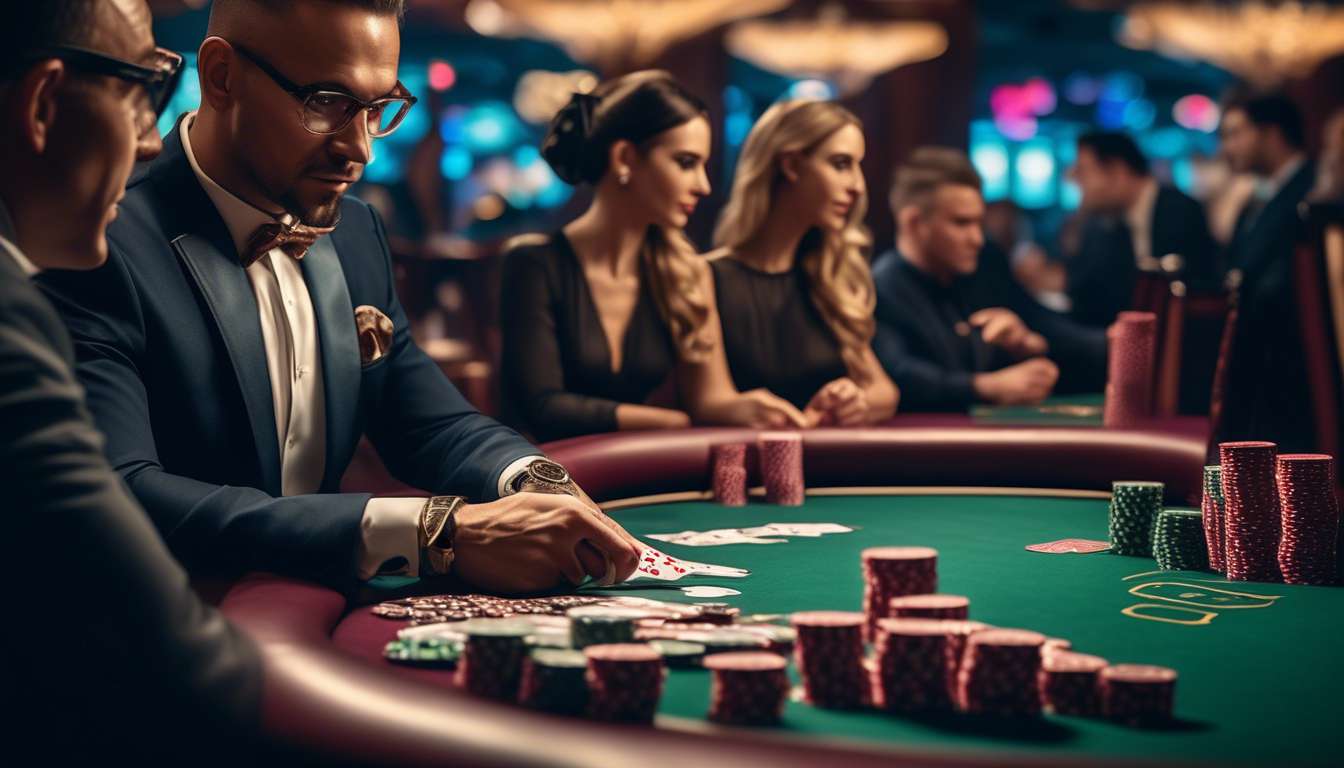As we embark on our exploration of the psychology behind gambling, we find ourselves diving into a world where human behavior intersects with chance, risk, and reward. Our curiosity drives us to understand what compels individuals to engage in this age-old activity, often teetering on the edge of thrill and peril.
Together, we aim to unravel the intricacies of the gambler’s mind, examining the cognitive processes and emotional triggers that fuel this complex phenomenon. By delving into the psychological motivations, we hope to shed light on the allure of gambling, from the casual player to those who find themselves ensnared in its grasp.
Our journey will take us through several key areas:
-
Anticipation: Understanding the excitement and expectation that precede gambling activities.
-
Decision-Making: Analyzing how choices are made under conditions of uncertainty and risk.
-
Societal Influences: Examining the impact of cultural and social factors on gambling behaviors.
We seek to comprehend why the roll of the dice or the shuffle of cards captivates so many. Join us as we uncover the layers of gambling psychology.
The Thrill of Uncertainty
The thrill of uncertainty draws us into gambling, as we eagerly anticipate the unpredictable outcomes. It’s not just about the potential reward; it’s the journey and the heart-pounding moments where risk-taking becomes our shared adventure. Together, we’re united by the rush that follows each roll of the dice or turn of a card, creating a sense of camaraderie among us.
In these moments, dopamine floods our brains, igniting a powerful sense of excitement and anticipation. This neurochemical reaction isn’t just a fleeting thrill; it binds us together in our quest for the next big win.
We recognize that cognitive biases like the gambler’s fallacy or the illusion of control often cloud our judgment. Yet, they add layers to our shared experiences, making each decision feel personal and collective.
Ultimately, it’s this blend of risk-taking and the intoxicating rush of dopamine that fuels our connection, inviting us to navigate the unpredictability of gambling as a united front.
Dopamine and Risk-Taking
Dopamine and Risk-Taking Behavior
Our brains release dopamine when we engage in risk-taking behaviors, creating a feedback loop that compels us to seek more thrilling experiences. We’re all connected by this shared neural response, making us crave the excitement of the unknown.
The Thrill Beyond Adrenaline
It’s not just about the adrenaline; it’s about feeling alive and part of something bigger. As we gamble, dopamine surges through our systems, reinforcing the allure of the game and the camaraderie it brings.
Cognitive Biases and Risk Perception
In these moments, our cognitive biases can cloud judgment, making risk-taking seem more appealing than it might objectively be. We often:
- Overestimate our odds of winning
- Underestimate potential losses
These biases are driven by the intoxicating rush of dopamine.
The Balance Between Fun and Compulsion
This collective experience, although thrilling, can sometimes blur the line between fun and compulsion. Recognizing these biases allows us to enjoy the thrill responsibly, maintaining a sense of belonging without losing control.
Navigating Chemistry and Choice
Together, we can navigate this complex interplay of chemistry and choice, finding balance in our shared journey.
Luck vs. Skill Debate
Many of us find ourselves questioning whether our gambling outcomes are determined more by luck or by skill. It’s a debate that resonates deeply with our community, as we all engage in risk-taking ventures from time to time.
We know that the thrill of gambling releases dopamine, a chemical that enhances our feelings of pleasure and reward. But how much of this thrill is influenced by our skills versus sheer chance?
In games like poker, skill plays a significant role.
- We hone our strategies.
- We read opponents.
- We make calculated decisions.
However, cognitive biases can cloud our judgment, leading us to attribute success to skill even when luck plays a substantial part.
On the other hand, slot machines rely heavily on luck, yet our minds often trick us into seeing patterns where none exist.
As a community, understanding the balance between luck and skill helps us make informed decisions.
This understanding fosters a shared experience and enhances our connection through these common explorations.
Reinforcement and Rewards
As we delve into the psychology of reinforcement and rewards, we notice how these mechanisms shape our gambling behaviors and keep us engaged.
Dopamine Release and Risk-Taking:
When we take risks, our brains release dopamine, the feel-good neurotransmitter, which rewards us for our boldness and makes us crave more of that exhilarating feeling. This rush creates a sense of belonging as we share similar experiences with others around us.
Anticipation of Rewards:
Our risk-taking tendencies are often fueled by the anticipation of rewards, which can overshadow rational decision-making. We’re drawn to the thrill of uncertainty, and even small wins can reinforce our desire to keep playing.
Reinforcement Mechanisms:
Casinos and gaming platforms cleverly design systems to maximize our engagement through reinforcement. These systems are structured to:
- Enhance the excitement of risk-taking.
- Provide intermittent rewards to maintain interest.
- Create a cycle of anticipation and gratification.
Understanding the Reward Cycle:
By understanding these dynamics, we see how our brains can be wired to crave the reward cycle, often ignoring losses. While cognitive biases may influence our perceptions, the blend of risk-taking, dopamine, and rewards keeps us coming back, seeking that shared sense of excitement and belonging.
Cognitive Biases in Gambling
Many of us fall prey to cognitive biases that distort our judgment and fuel irrational decisions while gambling. We often overestimate our chances of winning, a bias known as the "illusion of control." This leads us to take unnecessary risks, believing we have power over random outcomes.
As we engage in risk-taking activities, our brains release dopamine, a neurotransmitter that rewards us with feelings of pleasure and excitement. This dopamine rush can make us feel part of an exclusive club, driving our desire for more thrilling experiences.
Another common bias is the "gambler’s fallacy," where we believe that past outcomes influence future results.
- We might think a losing streak means a win is due.
- Each bet remains independent despite this belief.
These cognitive biases can create a false sense of community as we share similar misconceptions with fellow gamblers.
Recognizing these mental traps helps us make more informed decisions, fostering a healthier, more responsible gambling environment for all of us.
Escapism and Emotional Regulation
Escapism Through Gambling
Many of us turn to gambling as a form of escapism, seeking refuge from our emotional distress and everyday challenges. In these moments, we find a temporary sanctuary where risk-taking feels thrilling and liberating.
The allure of the unknown and the potential for reward flood our brains with dopamine, giving us a temporary high that seems to soothe our troubles. It’s important to recognize this shared experience, as it helps us understand why we might be drawn to this behavior despite its risks.
Cognitive Biases and Gambling
Our cognitive biases often magnify this allure, convincing us that our luck is due to change or that we’re just one bet away from a breakthrough. We might believe we’re skillfully navigating the odds, when in reality, we’re caught in a cycle that can blur the lines between reality and fantasy.
Regulating Emotions and Building Connections
By acknowledging these patterns, we can better regulate our emotions and find healthier ways to cope. Building connections that foster understanding and support can help in managing these impulses more effectively.
Addiction and Compulsive Behavior
Countless individuals find themselves trapped in the cycle of gambling addiction, where the compulsion to bet becomes overwhelming and destructive. This is a shared struggle that many can relate to, whether directly or through someone we know.
The thrill of risk-taking releases dopamine, a chemical in our brain that makes us feel good. This creates a temporary rush that can lead individuals to chase that feeling repeatedly. Unfortunately, while seeking that high, the growing impact on one’s life and relationships is often overlooked.
As we delve into the psychology behind gambling behavior, we uncover how cognitive biases play a significant role. These mental shortcuts trick individuals into continuing to gamble despite mounting losses. Key biases include:
- Illusion of Control: The belief that one can influence outcomes that are actually determined by chance.
- Gambler’s Fallacy: The mistaken belief that past events affect the probability of future independent events.
Understanding these patterns reveals that individuals are not alone in facing these challenges. By recognizing the impact of these cognitive biases, we can work towards seeking support and overcoming the grip of addiction together.
Responsible Gambling Practices
To promote responsible gambling, we must recognize the importance of setting limits and staying informed about the potential risks involved. Together, we can cultivate a community where everyone feels secure and respected. By understanding our own risk-taking behaviors, we can make better choices that keep gambling fun and safe for all.
Understanding the Role of Dopamine:
- Be aware of the role dopamine plays in our desire to gamble.
- This neurotransmitter can make the thrill of risk-taking feel rewarding, encouraging us to chase losses or bet beyond our means.
- By acknowledging this, we gain control over our impulses and can enjoy gambling without falling prey to its pitfalls.
Cognitive Biases in Gambling:
- We need to be mindful of cognitive biases that may cloud our judgment.
- Recognizing patterns, like the gambler’s fallacy, helps us stay grounded.
- Avoid the trap of believing that past losses increase future win chances.
Community Practices:
- Embrace these practices as a community to safeguard our well-being.
- Foster a supportive environment for all individuals involved in gambling.
By being informed and conscious of these elements, we can ensure a responsible and enjoyable gambling experience for everyone.
What are the early signs of gambling addiction that often go unnoticed?
Recognizing Gambling Addiction
Sometimes, we miss the subtle signs of gambling addiction. Key indicators include:
- Increased time spent gambling
- Hiding losses
Behavioral Changes
We could overlook changes in behavior, such as:
- Irritability or restlessness when not gambling
Financial and Secretive Behavior
Keeping an eye out for:
- Financial troubles
- Secretive behavior
Community Support
By noticing these signs within our community, we can offer support and guidance to those who may need it most.
How does cultural background influence gambling behavior and attitudes?
Our cultural background plays a significant role in shaping our attitudes and behaviors towards gambling.
It influences the norms, values, and traditions that guide our perspectives on risk-taking and luck. Celebrations, beliefs, and societal expectations can all contribute to how we approach gambling activities.
Understanding these cultural influences can provide valuable insights into why different communities have varying relationships with gambling practices.
-
Norms and Values: Cultural norms dictate what is considered acceptable or taboo, which directly affects gambling behaviors.
-
Traditions and Celebrations: Many cultures integrate gambling into festive occasions or rituals, normalizing the activity.
-
Beliefs and Superstitions: Cultural beliefs about luck and fate can influence how individuals engage with gambling.
Recognizing these cultural factors can help in developing more effective policies and support systems tailored to diverse communities.
What are the economic impacts of gambling on communities and individuals?
Gambling can have significant economic impacts on communities and individuals.
It can create jobs, boost local businesses, and contribute to tax revenues. These economic benefits can lead to improved community infrastructure and services, enhancing the overall quality of life.
However, there are also potential drawbacks. Gambling can lead to financial strain for some individuals and families, especially if not done responsibly. This can result in increased demand for social services and support.
To ensure that communities thrive while supporting those who might be negatively affected, it is important to strike a balance between the benefits and potential drawbacks of gambling.
Key considerations include:
-
Regulation and Oversight
- Implementing strict regulations to ensure fair play.
- Monitoring gambling activities to prevent addiction and fraud.
-
Community Support Programs
- Providing resources and support for individuals who may face gambling-related issues.
- Offering educational programs to promote responsible gambling behaviors.
-
Economic Planning
- Using tax revenues from gambling to fund community projects and services.
- Ensuring that economic benefits are distributed equitably within the community.
By addressing these areas, communities can maximize the positive impacts of gambling while mitigating its negative effects.
Conclusion
In conclusion, understanding the psychology of gambling is crucial for recognizing several important aspects:
- The Powerful Pull of Uncertainty
- Dopamine’s Role in Risk-Taking
- The Impact of Cognitive Biases
By acknowledging the fine line between luck and skill, individuals can:
- Practice responsible gambling
- Be aware of the potential for addiction
Engaging in gambling more mindfully involves:
- Staying informed
- Being mindful of your behaviors
Remember, these are key in navigating the world of gambling effectively.




